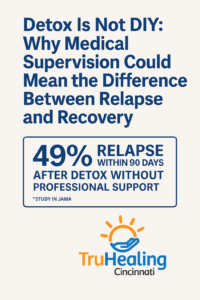If you’ve made it through 90 days of sobriety, you’ve already done something hard—something powerful. So if you’ve recently relapsed, that doesn’t mean you’re back at square one. But it might mean you’re facing a new kind of crossroads. And if detox is part of your next step, here’s something you deserve to hear clearly: detox is not something you should have to manage alone.
Why Detox Without Medical Help Can Be Dangerous
There’s a reason detox is medically supervised at every legitimate treatment center—it can be unpredictable, physically risky, and emotionally destabilizing.
Depending on what substances are in your system and how long you’ve used them, withdrawal symptoms can include:
- Severe anxiety or depression
- Dehydration or malnourishment
- Seizures, hallucinations, or heart complications
- Cravings strong enough to lead to immediate reuse
Trying to white-knuckle it at home might sound strong, but it’s not safe. And it’s not necessary. You’re not weak for needing help—you’re wise for choosing it.
Detox isn’t just about willpower. It’s about biology, chemistry, and risk management. The body goes through enormous stress during withdrawal. Without trained professionals to assess and intervene, even mild symptoms can become serious fast.
What Medical Detox Really Looks Like
At TruHealing Cincinnati, our medical detox program in Ohio isn’t cold or clinical—it’s structured, supportive, and designed to ease both physical and emotional strain. Here’s what that typically includes:
- 24/7 Monitoring: Medical staff is available around the clock to respond to any complications or discomfort.
- Medication-Assisted Support: Withdrawal symptoms are managed using safe, evidence-based medications that reduce suffering and risk.
- Personalized Treatment Planning: As detox stabilizes your body, we begin preparing the next phase of your care, ensuring a seamless transition.
- Emotional and Mental Health Support: Counselors and support staff check in regularly, providing encouragement and clarity when you need it most.
This isn’t just about getting substances out of your body. It’s about getting through the hardest part in the safest, clearest way possible—so you’re strong enough for what comes next.
The Relapse Risk of “Going It Alone”
When you detox at home, the margin for error is thin. One sleepless night or moment of panic can turn into another relapse. And that’s not a failure of willpower—that’s biology.
Medical detox lowers the chance of that spiral by:
- Addressing pain and symptoms early
- Removing access to substances during your most vulnerable window
- Surrounding you with people who know what to look for—and how to help
- Creating a therapeutic environment that reduces stress and guilt
Without medical care, your body and brain are working overtime without support. It’s not a test of strength. It’s a setup for struggle. And you deserve better.
You’ve Already Done Something Hard. Let Us Help With the Next Hard Thing.
Relapsing after 90 days can feel disorienting—like everything you built just crumbled. But here’s what we’ve seen, over and over again: people come back stronger when they return with support, not shame.
Detox isn’t the whole journey. But it can be the difference between restarting and spiraling. Medical detox is a doorway—one that leads to a clearer mind, a steadier heart, and a safer path forward.
Choosing the Right Medical Detox in Ohio
Not every program understands relapse. At TruHealing Cincinnati, we do.
We specialize in treating people who have relapsed after significant sobriety milestones. We know how to support you without judgment, and how to help you stabilize without making you feel like a beginner again.
Explore our Ohio detox program at TruHealing Cincinnati and see what it feels like to be welcomed back, not judged.
FAQ: Medical Detox at TruHealing Cincinnati
Is medical detox really necessary after a relapse?
Yes. Even if you’ve detoxed before, every relapse resets your body’s tolerance and can create new risks. Medical detox ensures your safety during this physically volatile time.
What substances require medical detox?
Common substances include alcohol, opioids, benzodiazepines, and stimulants. Each comes with unique risks, especially during withdrawal. Our team tailors your detox based on your history and current use.
How long does medical detox take?
Most detox programs last between 5–7 days, but this can vary. We assess your physical and emotional health to determine the right length for you.
Can I go straight into a treatment program after detox?
Yes. Detox is the first step. From there, we work with you to continue care through outpatient, IOP, or residential services—whatever fits your needs.
What if I’m embarrassed to come back?
Then you’re exactly who we want to see. We know relapse is hard. We don’t expect perfection. We respect your strength for returning.
📞 Ready to Rebuild Safely?
Call us at (513) 653-1233. You’ll talk to someone who understands relapse, respects your experience, and will help you find the safest next step forward—without shame, without pressure, and with medical support that truly makes a difference.


